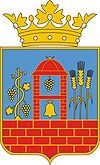Szekszárd
| Szekszárd | ||
|---|---|---|
| City | ||

Aerial view
|
||
|
||
| Location of Szekszárd | ||
| Coordinates: 46°21′21″N 18°42′14″E / 46.35597°N 18.70382°ECoordinates: 46°21′21″N 18°42′14″E / 46.35597°N 18.70382°E | ||
| Country |
|
|
| County | Tolna | |
| Area | ||
| • Total | 96.27 km2 (37.17 sq mi) | |
| Elevation | 83 m (272 ft) | |
| Population (2011 census) | ||
| • Total | 33,720 | |
| • Density | 359.98/km2 (932.3/sq mi) | |
| Time zone | CET (UTC+1) | |
| • Summer (DST) | CEST (UTC+2) | |
| Postal code | 7100 | |
| Area code(s) | 74 | |
| Website | www |
|
Szekszárd (Hungarian: [sɛksaːrd] ![]() , German: Sechshard, Croatian: Seksar) is a city in Hungary and the capital of Tolna county. By population, Szekszárd is the smallest county capital in Hungary; by area, it is the second smallest (after Tatabánya).
, German: Sechshard, Croatian: Seksar) is a city in Hungary and the capital of Tolna county. By population, Szekszárd is the smallest county capital in Hungary; by area, it is the second smallest (after Tatabánya).
Szekszárd lies at the meeting point of the Transdanubian Hills and the Great Hungarian Plain.
Szekszárd was first mentioned in 1015. The Benedictine monastery of the town was founded by King Béla I in 1061.
During the reign of King Matthias, Szekszárd was the estate of Bishop John, who was involved in a conspiracy against the king. Because of this, King Matthias ordered the castle of Szekszárd to be demolished.
In 1485, Szekszárd was already a significant town, holding five market days a year, but during the Turkish ascendancy of Hungary, the town became deserted and the monastery was destroyed.
By the 18th century, Szekszárd was again a significant town, it became a county seat, and got a coat of arms. The town was destroyed by a fire in 1794, but it could not stop the town's development. Most of the important buildings – including the town hall, the County Hall and several churches – were built during the 19th century. By this time, Szekszárd already had 14,000 residents.
...
Wikipedia


